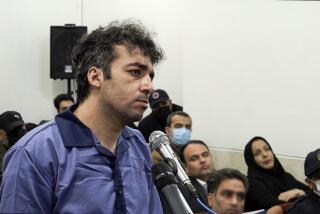Till (His) Death Do They Part in Iran
- Share via
TEHRAN — Married at age 13 to a man 18 years her senior, Ferdows was the wife that Iranian society expected her to be: obedient and silent, despite the beatings and the humiliation.
But after 30 years of marriage, she had had enough. She arranged to have her husband, Hedayat, killed, authorities say.
Ferdows, who has been convicted of murder and sentenced to death, is one of at least 20 Tehran women accused of murdering their husbands since February. Initially, the reports of the slayings were largely unnoticed. That changed as the number rose and Iranians began to see the killings as signs of social stress.
“Husband-killing is a new phenomenon in Iran’s male-dominated society. It means economic hardships and social crises are reaching a crisis point,” sociologist Mohammad Ahmadi said.
He cited a number of problems in Iranian society that lead to frustration and desperation: forced marriages, philandering by husbands, impotence, poverty and no healthy entertainment in a country whose Islamic laws ban socializing between men and women who are not closely related.
Others blame restrictive divorce laws that leave women feeling that murder is the only way out of a bad marriage.
In Ferdows’ case, she accused her husband of abuse.
“During 30 years of matrimonial life, Hedayat always beat me. He was a doubter and skeptical of everything and didn’t trust me. He had made life hell for me,” Ferdows told authorities, who have identified her only by her first name.
Ferdows paid a man the equivalent of $3,750 to stab Hedayat to death three years ago, prosecutors said. The crime wasn’t exposed until February this year, when police found her husband’s remains in an abandoned building. She had told people that Hedayat abandoned her.
Ferdows and the hit man were convicted and sentenced at a closed trial in April. Word of the outcome leaked out a few weeks ago.
The punishment for women who murder their husbands is death. Some already have been convicted and executed. Others are on death row and some are awaiting trial. They come from all social classes.
“Divorce is the first solution for women to get rid of an undesirable troubled life. But why did these women ignore this option and resort to something that carries the death sentence?” asked the monthly magazine Zanan, or Women.
Iranian men can divorce almost at will, but a woman who wants a divorce must go through a legal battle that can take as long as 20 years, lawyer Sara Irani said. Even then, she said, it might end with the woman failing to dissolve the marriage.
Under Iran’s Islamic laws, a man can keep four spouses at one time, a right not granted women.
Even if a husband is having an affair, he can claim to have undertaken a sigheh, or temporary marriage. It’s a contract allowed under Iranian law that allows a man and woman to be “married” for any length of time they choose. Critics call legalized prostitution.
Nor does a woman trapped in a violent marriage have much recourse against her husband.
“A woman has to bring four men witnesses confirming violence against her by her husband,” Irani said. “How is a woman in Iran expected to keep four men in her bedroom to witness her husband beating her?”
Irani, who also writes about women’s affairs, said that husband-killing is the “outcome of humiliation and discrimination against women,” and that the recent surge in cases should pressure the country’s leaders to improve legal protection for women.
Ahmadi, the sociologist, said that, in a country where there is virtually no sex education, unhappy marriages and domestic violence also can arise when husbands and wives don’t know how to please each other. “Many couples don’t have enjoyable sex,” he said.
Abdosamad Khorramshahi, a lawyer, sees social changes contributing to the killings.
“Previously, we had a socially closed society. Women were not allowed even to get out of the home without the husband’s permission. Now, things have changed. They are more outspoken and courageous. Women have become aware of their rights and are fighting for equality,” he said.
According to official figures, 44,000 Iranians were divorced last year, a 12% increase from 2000. At the same time, registered marriages were down 4.5%.
More to Read
Sign up for Essential California
The most important California stories and recommendations in your inbox every morning.
You may occasionally receive promotional content from the Los Angeles Times.













